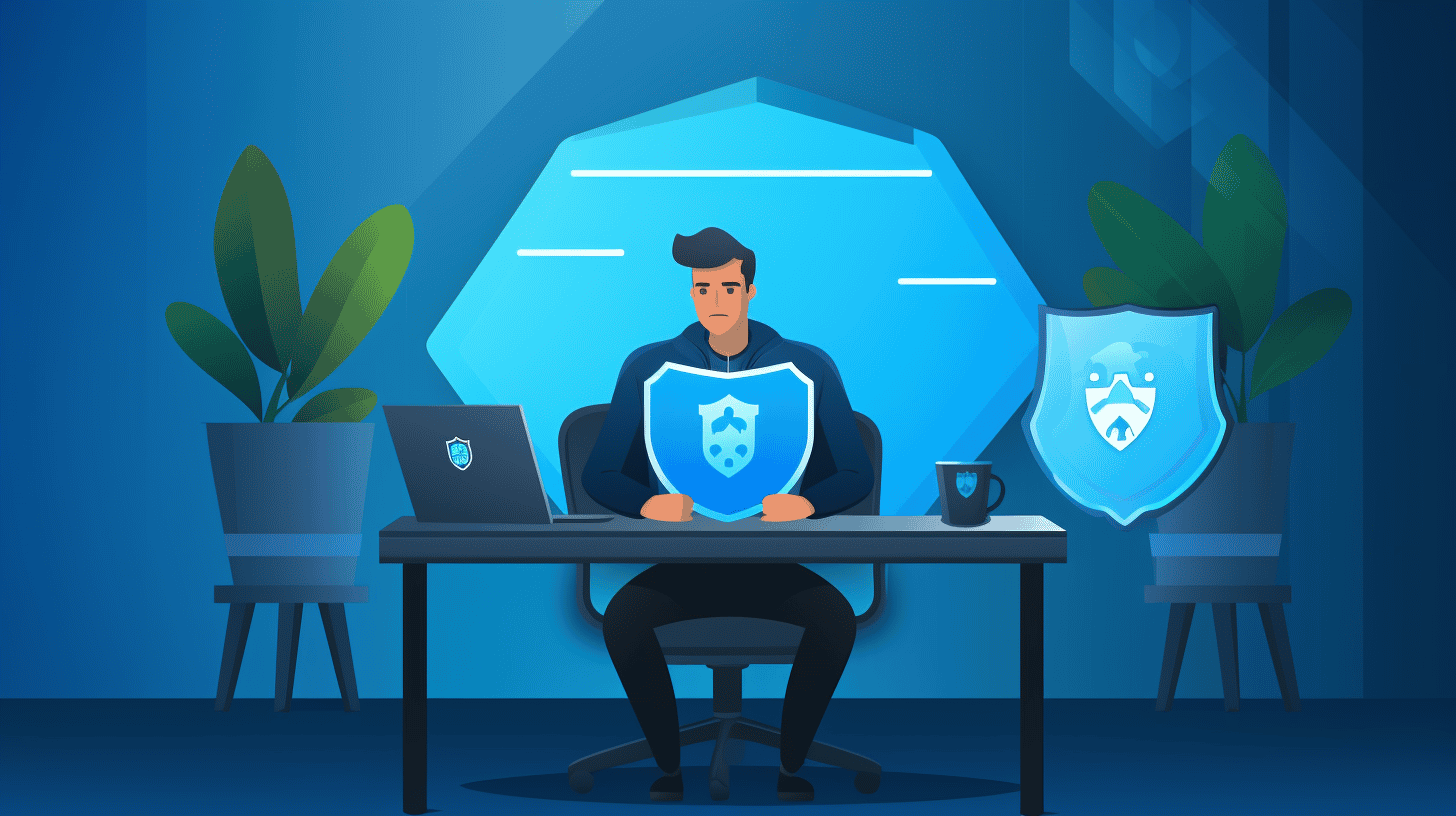在當今數位時代,網站已經成為企業和個人不可或缺的工具。 WordPress 憑藉其用戶友好的介面和強大的功能,已成為創建和管理網站的領先平台之一。無論您是經驗豐富的自由工作者還是剛進入該行業,優先考慮 WordPress 網站的安全性都非常重要。
🔒 安全是網站所有者最關心的問題,因為違規的後果可能很嚴重。從洩漏的用戶資料到損害的聲譽,安全事件的影響可能是毀滅性的。這就是為什麼對於像您這樣的自由工作者來說,熟悉 WordPress 安全技術至關重要。
💡 本文將為您提供增強 WordPress 網站安全性的重要技巧和技術。我們不僅將探討 WordPress 網站面臨的常見漏洞,還將深入研究這些漏洞的起源。此外,我們還將討論額外的安全措施和防止資料遺失的保護措施。
透過實施這些安全措施,您可以確保客戶的網站免受惡意攻擊,並為他們提供應有的安心。那麼,讓我們深入了解如何加強您的 WordPress 網站以抵禦潛在威脅。
WordPress 的使用與安全挑戰
在當今的數位環境中,WordPress 已成為建立網站的首選平台。其用戶友好的介面、豐富的插件庫和可自訂的主題使其成為個人和企業的最愛。然而,隨著它的廣泛流行,也帶來了一個重大挑戰:安全性。讓我們探討與 WordPress 相關的使用和安全性挑戰。
WordPress 使用概述
WordPress 在網站建立領域的主導地位令人印象深刻。考慮以下統計數據:
- 網路上 43.1% 的網站都使用 WordPress 作為支撐,因此它成為了駭客的首要目標[1].
- 據估計,WordPress 每分鐘面臨近 90,000 次攻擊,凸顯了安全挑戰的規模[2].
- 每天約有 13,000 個 WordPress 網站遭到駭客攻擊,這揭示了網站所有者面臨的始終存在的風險[2].
這些數字表明,WordPress 不僅對網站創建者俱有吸引力,而且對試圖利用漏洞實現各種目的的網路犯罪分子也具有吸引力。為了確保您的網站安全,了解最常見的安全漏洞至關重要。
常見漏洞
與其他內容管理系統一樣,WordPress 也無法避免安全漏洞。以下是駭客利用的一些最常見漏洞:
- 跨站點腳本 (XSS): 該漏洞允許駭客將惡意腳本注入毫無戒心的用戶查看的網頁中。在 WordPress 中發現的所有漏洞中,XSS 攻擊佔了 53.3%[3].
- 過時的外掛和主題: 使用過時的外掛程式和主題可能會使您的網站容易受到攻擊。駭客經常利用過時軟體版本中的漏洞來獲取對網站的未經授權的存取。
- 弱密碼: 使用弱密碼或容易被猜到的密碼是常見的安全陷阱。為您的 WordPress 管理員帳戶使用強大而獨特的密碼來抵禦暴力攻擊非常重要。
透過了解這些常見漏洞並採取主動措施防止它們,您可以顯著降低 WordPress 網站遭受駭客攻擊的風險。實施強大的安全措施並定期更新外掛程式和主題是強化您的網站的關鍵步驟。
若想深入了解 WordPress 安全的世界,請查看「掌握 WordPress 安全性」的綜合指南[4]。它提供寶貴的見解和實用技巧,幫助您保護您的網站免受潛在威脅。
請記住,雖然 WordPress 提供了無與倫比的便利性和功能,但必須優先考慮安全性以保護您的網站並維護其完整性。保持警惕,隨時了解情況,保護您的 WordPress 網站免受網路威脅。
🔐 請記住:您的網站的安全掌握在您手中!
[2] 來自內部來源的數據
[3] 來自內部來源的數據
WordPress 中的漏洞來源
WordPress 是一種廣受歡迎的內容管理系統,以其靈活性和易用性而聞名。然而,與其他軟體一樣,它並不能完全免受漏洞的影響。這些漏洞可能會使網站面臨安全風險,因此了解其來源並採取必要的預防措施至關重要。在本文中,我們將探討 WordPress 中的兩個主要漏洞來源:核心軟體和外掛程式/主題。
WordPress 核心軟體
WordPress 核心軟體是每個基於 WordPress 的網站的基礎。它包括管理內容、使用者身份驗證和平台整體功能所需的元件。雖然核心軟體的設計和維護都充分考慮了安全性,但它仍然並非完全沒有漏洞。
根據領先的 WordPress 安全性外掛 iThemes Security 的數據,2022 年發現的漏洞中只有一小部分(1.3%)歸因於 WordPress 核心軟體[1]。這些數據顯示WordPress核心團隊正在積極解決安全性問題並發布更新以及時修復漏洞。
外掛和主題
外掛和主題在擴展 WordPress 網站的功能和外觀方面發揮著至關重要的作用。由於有成千上萬的免費和付費選項可供選擇,因此它們對 WordPress 生態系統中發現的漏洞總數貢獻巨大也就不足為奇了。事實上,WordPress 中高達 97% 的漏洞來自外掛程式和主題[3].
光是 2022 年,iThemes Security 就發現了 93.25% 源自外掛的 WordPress 漏洞[1]。這強調了選擇和安裝外掛和主題時謹慎的重要性。雖然許多外掛程式和主題都經過嚴格的安全審查,但其中一些可能包含可被攻擊者利用的漏洞。
為了保護您的 WordPress 網站免受漏洞攻擊,選擇信譽良好的外掛程式和主題並保持最新的安全修補程式至關重要。定期更新您的 WordPress 安裝、外掛和主題是最大限度降低已知漏洞相關風險的有效策略。
為了進一步加強 WordPress 網站的安全性,請考慮實施全面的安全解決方案。如果你有興趣比較 WordPress 保護的不同選項,請查看這篇有關託管 WP 的文章,其中比較了 WordPress 保護選項[2].
請記住,主動採取 WordPress 安全措施可以幫助保護您的網站並保護其免受來自核心軟體和外掛程式/主題的潛在漏洞的侵害。
🔒 請繼續關注下一部分,以了解有關保護 WordPress 網站免受漏洞攻擊的具體策略的更多資訊。
基本的 WordPress 安全性提示
談到網站安全,WordPress 用戶有責任保護他們的網站免受潛在威脅。透過採取適當的安全措施,您可以降低駭客攻擊、資料外洩和其他安全問題的風險。
在本文中,我們將探討每個網站所有者都應實施的三個基本 WordPress 安全性提示。透過遵循這些提示,您可以增強 WordPress 網站的安全性並確保寶貴資料的安全。
雙重身分驗證
保護 WordPress 網站最有效的方法之一是啟用雙重認證 (2FA)。這額外的安全層可確保即使有人獲得了您的密碼,他們也將無法在沒有二次身份驗證方法(例如發送到您手機的唯一代碼)的情況下存取您的帳戶。
使用雙重認證的好處如下:
- 為您的 WordPress 登入新增額外的保護層。
- 降低未經授權存取您的帳戶的風險。
- 讓您安心,因為您知道您的網站受到了更好的保護。
要在 WordPress 網站上啟用雙重認證,你可以使用類似 雙重因素 或者 谷歌身份驗證器。這些外掛可以輕鬆設定和管理 WordPress 登入的 2FA。
強密碼🔐
WordPress 安全的另一個基本面向是使用強密碼。弱密碼或容易被猜到的密碼可能會使您的網站容易受到暴力攻擊和未經授權的存取。透過使用強密碼,可以大幅降低他人成功入侵您帳號的可能性。
以下是創建強密碼的一些技巧:
- 使用大寫和小寫字母、數字和符號的組合。
- 避免使用常用短語、字典中的單字或個人資訊。
- 密碼長度至少為 12 個字元。
- 使用密碼管理器產生並安全地儲存您的密碼。
請記住,多個帳戶使用相同的密碼是大忌。如果一個帳戶被盜用,所有使用相同密碼的其他帳戶也面臨風險。因此,每個帳戶請始終使用唯一的密碼。
定期更新🔄
定期更新您的 WordPress 核心、主題和外掛程式對於維護網站安全至關重要。更新通常包括重要的安全性修補程式和錯誤修復,以解決開發人員發現的漏洞。
這就是為什麼定期更新至關重要:
- 保護您的網站免受已知漏洞的侵害。
- 提高性能和穩定性。
- 確保與最新特性和功能相容。
要隨時了解更新,請遵循以下最佳做法:
- 盡可能啟用 WordPress 核心、主題和外掛的自動更新。
- 定期手動檢查更新並及時應用它們。
- 在應用重大更新之前請備份您的網站,以避免潛在的問題。
透過優先進行定期更新,您可以最大限度地減少遇到安全威脅的機會並確保您的 WordPress 網站順利運行。
實施這三個基本的 WordPress 安全性提示將大大增強您網站的安全性。請記住,安全是一個持續的過程,需要不斷保持警覺才能防範潛在威脅。
有關提高 WordPress 安全性的更多全面提示和策略,請查看此 文章。保持安全並保護您的網站免受網路犯罪分子的侵害!
額外的安全措施
說到 WordPress 安全性,可以採取一些額外措施來進一步保護您的網站。這些措施不僅有助於保護您的網站免受潛在威脅,還能讓您和您的訪客安心。在本節中,我們將探討一些可以實施以加強網站防禦的基本安全措施。
安全插件
增強 WordPress 網站安全性最有效的方法之一是使用安全性外掛程式。這些外掛程式旨在偵測和防止惡意活動,監控您的網站是否有漏洞,並提供針對潛在威脅的全面保護。一些流行的安全插件包括:
- 字柵欄 – 提供即時威脅防禦和防火牆保護,以及惡意軟體掃描和登入安全功能。
- 蘇庫里安全 – 提供全面的安全功能,包括惡意軟體掃描、檔案完整性監控和網站防火牆。
- i主題安全 – 提供一系列安全功能,如暴力破解保護、文件變更偵測和雙重認證。
透過安裝和設定可靠的安全插件,您可以顯著增強 WordPress 網站的安全性並保護其免受潛在威脅。
SSL 實現
為您的 WordPress 網站實施 SSL(安全通訊端層)加密是另一個重要的安全措施。 SSL 會對您的網站與其訪客之間傳輸的資料進行加密,確保其不會被未經授權的一方攔截。在交換敏感資訊(例如登入憑證或付款詳情)時,這一點尤其重要。
要在您的 WordPress 網站上實施 SSL,您需要從受信任的憑證授權單位 (CA) 取得 SSL 憑證並在您的 Web 伺服器上進行設定。許多網站寄存服務供應商都提供了為您的網站啟用 SSL 的簡單方法,因此請務必諮詢您的提供者以取得具體說明。
更改預設設定
更改預設設定也有助於提高 WordPress 網站的安全性。透過修改預設設置,您可以使攻擊者更難以攻擊常見的漏洞。需要更改的兩個重要設定是:
- 預設 WordPress 登入頁面 URL:預設情況下,可以透過「/wp-login.php」或「/wp-admin」路徑存取WordPress登入頁面。將登入頁面 URL 變更為自訂位址可以增加額外的保護層,因為它使攻擊者更難找到和利用您的登入頁面。
- 資料庫前綴:WordPress 使用「wp_」作為資料庫表的預設前綴。將此前綴更改為唯一的前綴有助於防止針對資料庫的潛在攻擊。
透過調整這些預設設置,您可以加強 WordPress 網站的安全性並降低未經授權存取的風險。
安全託管選項
選擇可靠且安全的網站寄存服務供應商對於維護安全的 WordPress 網站至關重要。尋找提供以下功能的託管服務提供者:
- 防火牆:具有強大防火牆系統的網路主機可以協助保護您的網站免受未經授權的存取和惡意攻擊。
- DDoS 保護:分散式阻斷服務 (DDoS) 攻擊可以透過向您的網站注入大量虛假流量來破壞您的網站。選擇提供 DDoS 保護的託管服務提供者來減輕此類攻擊。
- 定期備份:為了防止安全漏洞或網站崩潰,定期備份您的 WordPress 網站至關重要。確保您的託管服務提供者提供自動備份或提供可輕鬆建立備份的工具。
透過選擇提供這些安全功能的託管服務供應商,您可以為您的 WordPress 網站添加額外的保護層。
請記住,保護您的 WordPress 網站是一個持續的過程。保持警惕、保持網站和插件更新、定期監控漏洞並實施這些額外的安全措施來保護您的網站及其訪客非常重要。
🔒「有關 WordPress 基本安全實踐的更多深入信息,請查看 本文」 🔒
防止資料遺失的保護措施
在當今的數位環境中,資料遺失是一個持續的威脅,可能對個人和企業造成嚴重後果。無論是安全漏洞還是技術故障,遺失寶貴的資料都可能造成毀滅性的後果。這就是為什麼實施有效的保護措施對於保護您的資訊至關重要。在本文中,我們將探討可採取的兩項重要措施來防止資料遺失: 定期備份 和 安裝新外掛和主題時要小心。讓我們開始吧!
定期備份
定期備份您的網站是防止資料遺失最重要的步驟之一。透過建立網站文件和資料庫的副本,您可以確保即使出現問題,您也擁有可以恢復的最新版本的網站。以下是定期備份時需要記住的幾個關鍵點:
- 頻率: 最好設定定期自動備份。這可以是每日、每週或更頻繁,具體取決於您的需求和網站更新頻率。
- 異地儲存: 將備份儲存在異地至關重要,以確保它們不會受到可能影響您網站的相同問題的影響。考慮使用雲端儲存服務或遠端伺服器來確保備份的安全性。
- 測試修復: 定期測試復原過程可確保您的備份正常運作。這一步經常被忽視,但從長遠來看可以為您省去很多麻煩。
請記住,備份是您的安全網。如果發生資料遺失事件,擁有最近的備份可以為您節省數小時甚至數天的工作時間。
安裝新外掛和主題時要小心謹慎
為您的 WordPress 網站添加新功能和視覺吸引力令人興奮,但在安裝新外掛程式和主題時務必小心謹慎。雖然許多外掛程式和主題都經過精心編碼和徹底審查,但其中一些可能存在漏洞,可能會使您的網站面臨安全風險。安裝新外掛程式和主題時請遵循以下一些準則:
- 研究與評論: 在安裝新的外掛程式或主題之前,請務必對其進行徹底的研究。查看評論、評分和用戶回饋,以了解其可靠性和安全性。
- 維護和更新: 確保您正在考慮的外掛程式或主題由其開發人員積極維護並定期更新。定期更新通常包括安全性修補程式和錯誤修復,使您的網站不易受到攻擊。
- 插件數量限制: 雖然外掛程式可以為您的網站增加功能,但插件太多可能會增加衝突、漏洞和效能問題的風險。僅安裝您需要的外掛程式並刪除任何過時或未使用的外掛程式。
透過在選擇外掛程式和主題時保持謹慎和選擇性,您可以最大限度地降低為您的網站引入漏洞的風險。
請記住,對於資料遺失來說,預防總是比治療更好。透過定期備份您的 WordPress 網站並在新增外掛和主題時小心謹慎,您可以大幅減少遺失寶貴資料的機會。實施這些保護措施,以確保您的網站安全無虞。
為了進一步增強 WordPress 網站的安全性,請考慮探索 管理 WP 的 WordPress 託管解決方案。其安全可靠的選項可為您提供額外的保護層,確保即使面臨意外挑戰,您的資料也能保持安全。
結論
總而言之,在當今的數位環境中,保護您的 WordPress 網站至關重要。透過遵循最佳實踐並實施本文討論的安全提示和技術,您可以顯著降低網路攻擊的風險並確保寶貴的數據和數位資產的安全。
請記住,WordPress 安全是一個持續的過程。了解最新的安全威脅和更新,並定期檢視和改進您的安全措施。如果您正在尋找可靠且全面的解決方案來管理您的 WordPress 網站的安全,請考慮使用 Managed-WP™。 Managed-WP™ 擁有優質的 WordPress 雲端託管平台、專家支援和主動監控,讓您安心專注於業務。
因此,立即採取行動,加強您的 WordPress 網站以抵禦漏洞和威脅,並享受更安全、更具彈性的線上狀態。 💪💻
了解有關 Managed-WP™ 的更多資訊以及它如何幫助保護您的 WordPress 網站
常見問題解答
- 為什麼 WordPress 安全對自由工作者很重要?
WordPress 安全性對於自由工作者來說非常重要,因為它有助於保護其客戶的網站免受駭客、惡意軟體和資料外洩的侵害。它也有助於維護自由工作者的專業聲譽和信譽。
- 對於 WordPress 自由工作者來說,有哪些重要的安全提示?
對於 WordPress 自由工作者來說,一些基本的安全提示包括:保持 WordPress 和外掛程式為最新版本、使用強大而獨特的密碼、啟用雙重認證、使用防火牆、定期備份網站以及使用可靠的安全插件。
- 自由工作者如何確保他們的 WordPress 網站的安全?
自由工作者可以透過遵循最佳實踐來確保其 WordPress 網站的安全,例如使用安全託管、定期監控網站日誌和安全掃描、限制登入嘗試、使用 SSL 憑證、刪除未使用的主題和外掛程式以及向客戶介紹安全最佳實踐。
- WordPress 有哪些常見的安全漏洞?
WordPress 中的一些常見安全漏洞包括過時的軟體、弱密碼、不安全的主題或外掛程式、檔案和目錄權限、SQL 注入以及跨網站腳本 (XSS) 攻擊。對於自由工作者來說,解決這些漏洞對於增強網站安全性至關重要。
- 有沒有專為 WordPress 設計的安全性外掛?
是的,有幾個專為 WordPress 設計的安全性外掛。一些流行的包括 Sucuri Security、iThemes Security、Wordfence Security、All In One WP Security & Firewall 和 BulletProof Security。這些外掛程式提供各種安全功能並有助於增強網站保護。



















